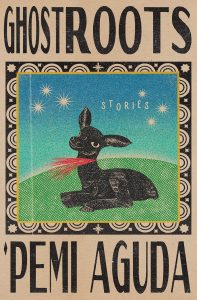Wole Talabi Reviews Ghostroots by ’Pemi Aguda
 Ghostroots, ’Pemi Aguda (W.W. Norton & Company 978-1-324-06585-2, $26.99, 224pp, hc) May 2024.
Ghostroots, ’Pemi Aguda (W.W. Norton & Company 978-1-324-06585-2, $26.99, 224pp, hc) May 2024.
Ghostroots, ’Pemi Aguda’s spectacular debut collection, is an instant classic. These 12 stories feature hauntings, reincarnations, invisible markets, dancing masquerades, shapeshifting houses, miracles, and magical transformations. Even the stories that aren’t overtly speculative possess a speculative, surreal sensibility. But regardless of the degree of imaginative calisthenics employed, the roots of every narrative in this collection runs deep, touching something profound, something fundamentally human – a constant questioning and yearning to situate ourselves as individuals within the world.
’Pemi should be no stranger to genre readers. She’s been published in venues like Tor.com (now Reactor) and Nightmare, won the 2021 Nommo award, received the 2019 Octavia E. Butler Memorial Scholarship, and was featured in the 2021 Year’s Best African Speculative Fiction anthol ogy. But she’s also well-known outside of genre, having been published in venues like Granta and Zoetrope, and awarded the O. Henry Prize for short fiction. I’ve been reading and loving ‘Pemi’s writing for more than a decade now and I am continuously stunned by her ability to reach new heights of literary brilliance. There is an aspect of clever design and construction in every story, an emotional and literary precision. There are no wasted words, every element of story converging to its purpose. Even when the endings are (occasionally) abrupt or ambiguous, it feels appropriate, the sense of incompleteness just another dimension of the story. After reading Ghostroots, you will probably be left with a feeling that you have just experienced something profound. I recommend you take a break between each story to fully luxuriate in it.
Of the 12 stories in Ghostroots, ten are reprints and two are original to this strong collection. Almost every one of them is a highlight, written with an impeccable eye for detail. The collection alternates between genre and nongenre work seamlessly, united by ’Pemi’s distinct voice and talent for crafting unsettling, numinous stories that move with a quiet, questioning energy. In the past, I’ve used the term Nigerian gothic to describe the bulk of her work. One could see the DNA of magical realism, Afrosurrealism, Afro-gothic, and postcolonial gothic, but these are mostly personal stories, focused on interiority, about individuals struggling with their identity, focused on their relationships with friends and family. The historical, political, and societal framework within which these struggles takes place is acknowledged but not foregrounded. Given the general murkiness of genre, the ongoing recontextualization of definitions, what Gary K. Wolfe calls the ongoing ‘‘evaporation of genre’’ and ’Pemi’s own thoughts on the matter (‘‘I don’t care for pigeon-holing… I’ll write my stories and hope that it will find its readers no matter what section it’s shelved under,’’), I’ll leave taxonomy to those more academically qualified. There is certainly a gothic sensibility to ’Pemi’s stories, though. A strong, consistent sense of atmosphere, heightened emotion and haunting, often from the perspective of women and girls. But it’s clear ’Pemi’s influences are wide and varied. From Alice Munro to Ngũgĩ wa Thiong’o. Suffice it to say that if you enjoy the work of Carmen Maria Machado, Helen Oyeyemi, Kelly Link, Ben Okri, or Lesley Nneka Arimah, you’re liable to love Ghostroots.
Most of the stories here take place in Lagos, my home city. I sometimes joke that Lagos is not a real place and ‘‘anything you see you should take it like that’’ because strange and contradictory things are part of the fabric of daily reality there. ’Pemi’s writing perfectly captures the city’s strange and chaotic nature and in return, the city grounds her stories.
To quote ’Pemi: ‘‘(I am…) seeking an understanding of this paradoxical city. Lagos doesn’t make sense, but it makes perfect sense.’’
The collection opens with ‘‘Manifest’’, which was one of my favorite stories of 2019 and one of ’Pemi’s strongest stories, in which a woman begins to believe she is possessed by her grandmothers’ spirit. It’s a statement opening and is emblematic of ’Pemi’s brilliance: from the use of the second person narrative to insert the reader into the characters frame of mind, to its casual escalation of violence, its religious overtones, its distinct linguistic Nigerianness and its ambiguous conclusion (it can be read as real spiritual possession or mental breakdown).
Another story which uses ambiguity to great effect is one of the original stories ‘‘The Wonders of the World’’ in which Abisola, a chronically unhappy young girl on a school trip to the mystical Erin-Ijesha waterfalls, befriends a classmate who claims to possess magical healing powers. The story never fully commits to confirmation or denial of this – instead using the events of the trip to navigate the emotional topography of a girl coming into womanhood and seeking a sense of place and belonging in the world.
Three of the stories have only a slight to vanishing speculative element. ‘‘Breastmilk’’ – the story of a woman who has just given birth and is trying to find a way to forgive her husband for a recent infidelity, includes a passing mention of a researcher who has developed a method for ‘‘smelling emotion’’; ‘‘Imagine Me Carrying You’’, about a woman whose mother has just accidentally killed a young girl and is slowly unravelling; and the previously unpublished ‘‘Girlie’’ (the only story I didn’t love) about a girl sent by her parents to work in the city to earn money, who is kidnapped on a visit to the market.
Of the more overtly genre stories, ‘‘Contributions’’ is one of my favorites. A short piece about a group of women who practice Esusu, a traditional financial collective to which all contribute and all benefit in turn. When a new member fails to make her contributions, members are forced to take things (including body parts) from her until nothing is left. In some ways it is a feminist inversion of a popular African folktale, the Yoruba version of which, as published in M.I. Ogumefu’s Yoruba Legends tells of a visitor from a land of spirits with only a head, who borrows body parts when he visits the human world to woo a bride. (Some readers may recognize a version of it from Amos Tutuola’s retelling in The Palm-Wine Drinkard). As an inversion of that story, ‘‘Contributions’’ is excellent, using the women’s actions to comment on the ways we define ourselves by societal and familial function and the often-unadmitted desire to be free of our burdens.
Yearning for freedom also shows up in two bittersweet stories about downtrodden women and markets (there are a lot of markets in Ghostroots). In ‘‘Birdwoman’’, Felicity, who ‘‘was born unhappy’’ meets a magician in the market on her birthday, and is turned into a bird, experiencing something like joy for the first time only to be brutally brought down to earth. ‘‘The Dusk Market’’ (which has a spectacular opening that moves so gracefully from second- to third-person POV you won’t notice) is a lovely and evocative piece about a hard-drinking street hawker who has lost herself in the city that is so easy to lose yourself in, until one day she glimpses a vibrant invisible spirit-market and becomes obsessed with finding her way back to it, to escape the hard reality of Lagos.
‘‘The Hollow’’ is a different kind of haunted house story, in which an architect is hired to renovate a shapeshifting house that has blood and secrets in its walls. Using ’Pemi’s own background as an architect to great effect, it’s a shrewd critique of traditional gender expectations, domestic violence, and cycles of abuse.
I’ve recommended ‘‘Things Boys Do’’ and ‘‘Masquerade Season’’ before and I am happy to do so again. In the first, three new fathers find the joy of their son’s births corrupted by something sinister. Slowly, their stories converge on each other and on an incident from the past in classic ‘‘sins of the father’’ style. ‘‘Masquerade Season’’ tells the story of Pauly, a ten-year-old boy who meets three masquerades (in Yoruba tradition, masquerades are not just people in costume, they are representations of spirits) that follow him home. Pauly’s mother at first admires them, but then she begins to take advantage of them, convincing him to let her cut pieces of them for use in her business. But each cut affects them and in turn her son, slowly chipping away until things come to a head. Masquerades used to be considered the domain of women in traditional Yoruba society until it became an exclusively men’s affair – a fact which adds a layer of fascination and complexity to the relationship between Pauly and his mother. It’s a lovely and deeply moving story about love and sacrifice and duty and giving and the limits of love and its somber but hopeful note is a perfect way to close the collection.
If you’ve never read ’Pemi’s work before, this is an excellent introduction. Ghostroots is an elegantly constructed, breathtakingly beautiful, numinous collection of stories that present emotional blueprints of the Lagosian soul as a way of investigating the larger human condition.
WOLE TALABI is an engineer, writer, and editor from Nigeria. He is the author of the nebula and BSFA award nominated novel SHIGIDI AND THE BRASS HEAD OF OBALUFON (DAW books/Gollancz) one of the Washington Posts Top 10 Science fiction and fantasy books of 2023. His short fiction has appeared in places like Asimov’s Science Fiction, Lightspeed Magazine, Africa Risen and is collected in the books CONVERGENCE PROBLEMS (DAW books, 2024) and INCOMPLETE SOLUTIONS (Luna Press, 2019). He has been a finalist for the Hugo, Nebula, BSFA and Locus awards, as well as the Caine Prize for African Writing. He has won the Nommo award for African speculative fiction and the Sidewise award for Alternate History. He has edited five anthologies including the acclaimed AFRICANFUTURISM: AN ANTHOLOGY (Brittlepaper, 2020) and MOTHERSOUND: THE SAUÚTIVERSE ANTHOLOGY (Android Press, 2023). He likes scuba diving, elegant equations, and oddly shaped things. He currently lives and works in Australia. Find him at wtalabi.wordpress.com and at @wtalabi on Twitter, Instagram, Bluesky and Tiktok.
This review and more like it in the May 2024 issue of Locus.
 While you are here, please take a moment to support Locus with a one-time or recurring donation. We rely on reader donations to keep the magazine and site going, and would like to keep the site paywall free, but WE NEED YOUR FINANCIAL SUPPORT to continue quality coverage of the science fiction and fantasy field.
While you are here, please take a moment to support Locus with a one-time or recurring donation. We rely on reader donations to keep the magazine and site going, and would like to keep the site paywall free, but WE NEED YOUR FINANCIAL SUPPORT to continue quality coverage of the science fiction and fantasy field.
©Locus Magazine. Copyrighted material may not be republished without permission of LSFF.






